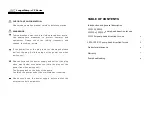
Basic Chemistry and Basic Corrosion Theory
2:23
CP 1 – Cathodic Protection Tester Course Manual
©
NACE International, 2000
02/01/05
Causes of Corrosion
General
Nearly all of the corrosion you will encounter can be divided into one of
two types—either a natural reaction or a stray current reaction. Naturally
occurring corrosion takes place because of local action cells on the surface
of the structure. These cells result from voltage differences caused by such
factors as surface irregularities, mill scale, oxygen concentrations,
differences in the electrolyte around the structure, and others. Stray current
reactions occur when some source of current, external to the structure itself,
causes corrosion on the structure.
Naturally Occurring Corrosion
Dissimilar Metals (Galvanic Corrosion)
The metal itself may be a source for the driving voltage of a corrosion cell.
A difference in voltage may arise due to differences in the natural energy
levels of different metals or composition variations formed during alloying.
Metals occur in nature in the form of various chemical compounds referred
to as
ores.
After ore is mined, the metallic compound is removed from the
rock-like ore and refined to produce a nearly pure state of the metal.
Various processes—mechanical, chemical, and electrical—are employed to
transform ores into useful metals. Regardless of the process, the metal
absorbs energy during the transformation. The amount of energy required
by a metal during the refining process determines the voltage or active state
of the metal. The voltage is relatively high for such metals as magnesium,
aluminum, and iron, and relatively low for such metals as copper and silver.
A useful way of viewing metals in the order of their activity is shown in
what is known as the
galvanic series
.
This series is based on metals in
seawater, but applies to metals in fresh water and underground. The series
is shown in Table 2.2. The potentials shown are approximate since they
vary somewhat depending on the environment. Potentials are shown vs. a
copper-copper sulfate.
Summary of Contents for CP 1
Page 1: ...CP 1 Cathodic Protection Tester Course Manual February 2005 NACE International 2000 ...
Page 265: ......
Page 266: ......
Page 267: ......
Page 268: ......
Page 301: ...RP0169 2002 32 NACE International ISBN 1 57590 035 1 ...
Page 535: ...TM0101 2001 24 NACE International ISBN 1 57590 137 4 ...
















































